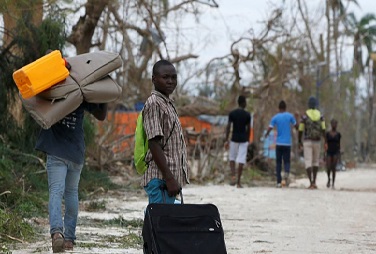
19 Sep 2017 | Focolare Worldwide
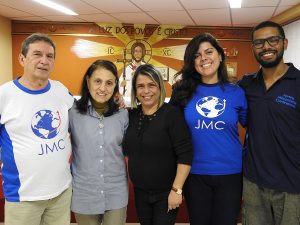 The words Pope Francis pronounced at the World Youth Day in Rio de Janeiro in 2013, “Go out and serve without fear,” triggered in the youths of the Focolare, the desire to take up the challenge. And so, those of the city of Juiz de Fora (500,000 inhabitants), in the Brazilian state of Minas Gerais, launched a project that gathers the youths of different charisms. “The aim is to testify to unity in the diversities of the Church,” they said, “and be disciples of Christ and missionaries, in line with the invitation of the Latin American bishops to all Christians. Of course, there are difficulties, but this does not discourage us.” It was Archbishop Gil Antonio Moreira who gave the group – of 60 – the name of “Young Continental Missionaries”. “We come from different spiritual experiences – they explained – Renewal in the Spirit, new Communities, parish groups and the Focolare Movement. The start of the mission consists in the personal consecration to God for a year, renewable for another year. And then there are three points that help set the compass: prayer, training and mission, and putting ourselves at the service of others.” F
The words Pope Francis pronounced at the World Youth Day in Rio de Janeiro in 2013, “Go out and serve without fear,” triggered in the youths of the Focolare, the desire to take up the challenge. And so, those of the city of Juiz de Fora (500,000 inhabitants), in the Brazilian state of Minas Gerais, launched a project that gathers the youths of different charisms. “The aim is to testify to unity in the diversities of the Church,” they said, “and be disciples of Christ and missionaries, in line with the invitation of the Latin American bishops to all Christians. Of course, there are difficulties, but this does not discourage us.” It was Archbishop Gil Antonio Moreira who gave the group – of 60 – the name of “Young Continental Missionaries”. “We come from different spiritual experiences – they explained – Renewal in the Spirit, new Communities, parish groups and the Focolare Movement. The start of the mission consists in the personal consecration to God for a year, renewable for another year. And then there are three points that help set the compass: prayer, training and mission, and putting ourselves at the service of others.” F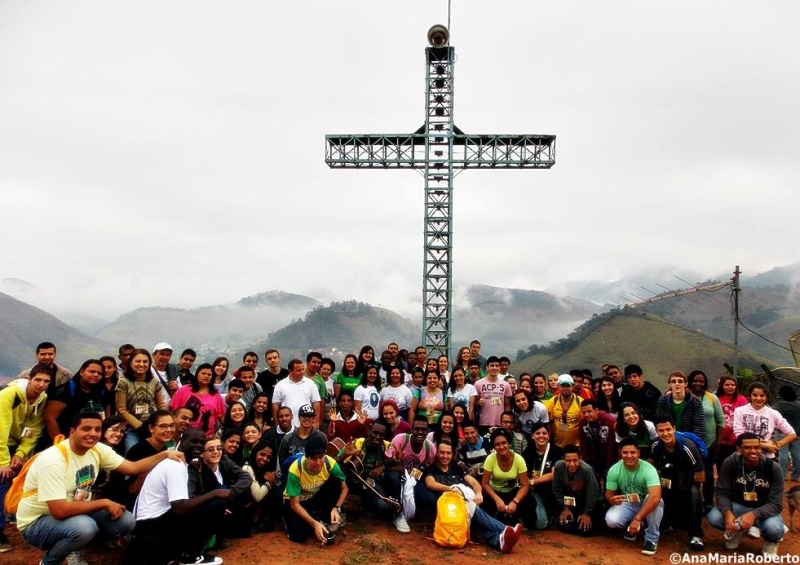 our years after the launch of the project, numerous missions have been undertaken in the parishes of the Juiz di Fora archdiocese, with a hundred visits to the families of the rural communities at the outskirts and violent districts of the city, the asylums and orphanages, and the rehabilitation centre for minors with criminal records. “We created socio-health programmes, as in the case of the battle against dengue (tropical disease), operating wherever there were the highest death rates. In particular, we worked to ensure hygiene in the environment, eliminating rubbish and dump sites that enhance the proliferation of mosquitoes that transmit the disease, but also informing the population through brochures and posters. At the moment we are carrying out special missions in Haiti and in the city of Obidos (State of Pará), in the Educational Centre for juvenile offenders and with the “cartoneros” (rubbish bin collectors of cardboard which is then recycled). We highlighted the importance of their work for the benefit of our great home: the planet Earth. We did not miss out in supporting the youth economically and psychologically, in particularly difficult situations. Furthermore, the “supportive Christmas” project enabled us to gather nonperishable food and other essential goods, that were then donated to a charitable institution.”
our years after the launch of the project, numerous missions have been undertaken in the parishes of the Juiz di Fora archdiocese, with a hundred visits to the families of the rural communities at the outskirts and violent districts of the city, the asylums and orphanages, and the rehabilitation centre for minors with criminal records. “We created socio-health programmes, as in the case of the battle against dengue (tropical disease), operating wherever there were the highest death rates. In particular, we worked to ensure hygiene in the environment, eliminating rubbish and dump sites that enhance the proliferation of mosquitoes that transmit the disease, but also informing the population through brochures and posters. At the moment we are carrying out special missions in Haiti and in the city of Obidos (State of Pará), in the Educational Centre for juvenile offenders and with the “cartoneros” (rubbish bin collectors of cardboard which is then recycled). We highlighted the importance of their work for the benefit of our great home: the planet Earth. We did not miss out in supporting the youth economically and psychologically, in particularly difficult situations. Furthermore, the “supportive Christmas” project enabled us to gather nonperishable food and other essential goods, that were then donated to a charitable institution.”  The Young Continental Missionaries began to settle in other places over time, and reached Obidos (State of Pará), the heart of the Amazons. “Coming in contact with the people, we saw that the call to missionary life echoed in them, and a variety of vocations came to the fore.” Surpassing the confines of Brazil, they even reached Haiti. Last 17 July, a group of six people of the archdiocese of Juiz de Fora and their archbishop set out for Haiti. The situation of that country is really challenging, 7 years after the earthquake that had devastated it: in just 24 seconds more than 300,000 buildings had collapsed among civil and institutional structures, causing the death of 200,000 people. With its magnitude of 7.2 on the Richter scale, it was the worst earthquake registered in the Americas. “Haiti is the poorest periphery of Latin America. And that is where, “Bishop Gil Antonio Moreira wrote, “my eyes and those of the Continental Missionary Youth are focusing on. With great joy we shall go to serve without fear, because the reason, and our goal, is Jesus Christ.” The youth of the Focolare concluded by saying: “Paradoxically, what assures us that we are on the right path are the difficulties we encounter, and in which we try to love a countenance of Jesus Forsaken, He is the secret of our joy and the fruits we have seen.”
The Young Continental Missionaries began to settle in other places over time, and reached Obidos (State of Pará), the heart of the Amazons. “Coming in contact with the people, we saw that the call to missionary life echoed in them, and a variety of vocations came to the fore.” Surpassing the confines of Brazil, they even reached Haiti. Last 17 July, a group of six people of the archdiocese of Juiz de Fora and their archbishop set out for Haiti. The situation of that country is really challenging, 7 years after the earthquake that had devastated it: in just 24 seconds more than 300,000 buildings had collapsed among civil and institutional structures, causing the death of 200,000 people. With its magnitude of 7.2 on the Richter scale, it was the worst earthquake registered in the Americas. “Haiti is the poorest periphery of Latin America. And that is where, “Bishop Gil Antonio Moreira wrote, “my eyes and those of the Continental Missionary Youth are focusing on. With great joy we shall go to serve without fear, because the reason, and our goal, is Jesus Christ.” The youth of the Focolare concluded by saying: “Paradoxically, what assures us that we are on the right path are the difficulties we encounter, and in which we try to love a countenance of Jesus Forsaken, He is the secret of our joy and the fruits we have seen.”
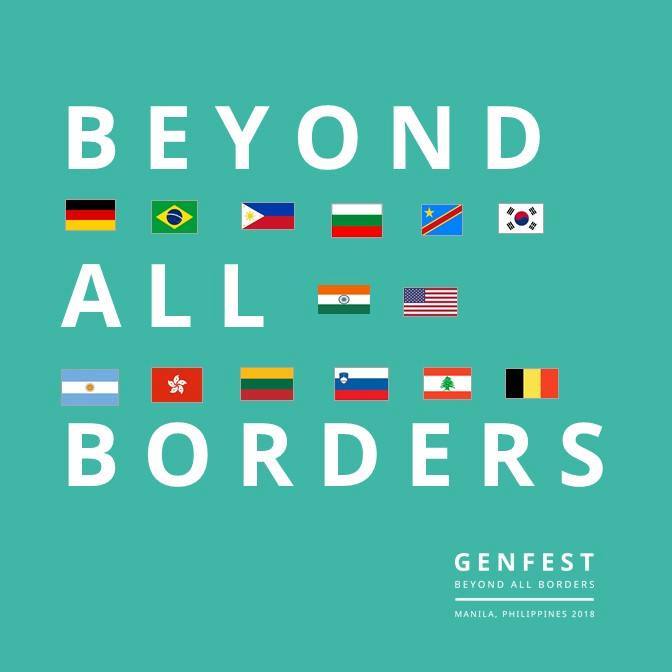
14 Sep 2017 | Focolare Worldwide
 Born from the determination to redesign a new geography that targets the bringing down of personal and planetary limits and fences, the world march of the Gen and Youth for a United World towards the 11th edition of the GenFest will be held from 6 – 8 July 2018 in Manila (Philippines). The central program will be held at the Metro Manila World Trade Center, while all the workshops will be held at the De La Salle Universityand other universities. It will be entitled “BEYOND ALL BORDERS.” Asia will thus be the continent of the future and of the youth who will host this convention. According to the data of the U. S. Census Bureau, three billion youths in the world are below 25 years of age and 60% of these live in Asia. And so, almost half of the Asian population (over 4 billion people) are under 25. “It is clear that the event could not but be held in our continent,” explained Kiara Cariaso, a Filipino and member of the organizing team. “We want the world to see not only the network of projects, camps, solidarity actions, support to lawfulness, and “no” to war and armaments, but also the solitude, abandonment and superficial relationships which millions of youth scattered around the world are already engaged in.” Aleppo, Bethlehem, Turunga, Mumbai: Genfest 2018 has been launched in various cities around the world. “Also this time the Genfest will be a milestone, essential to the journey towards a united world,” Maria Guaita and Marco De Salvo of the United World Youth’s central secretariat explained, “to share the ongoing endeavours for unity and peace, and also to gain strength and courage from one another. Many of the youths live in territories of war, conflict and social distress. This is the frontline where many have chosen to start changing the world.” “We are working various fronts: we are in the peripheries, but we engage in education, sport and solidarity,” pointed out Rafael Tronquini, Brazilian, of the Genfest Marketing Team – who has been in Manila for 5 months now, “We want to be there where we see the needs and hear our people’s cries for help at all latitudes. We could summarise the Genfest logo with the motto: ‘less is more’. There are infinite challenges and barriers but what matters is to overcome them together and take one step ahead towards unity.” y4uw.org/ https://youtu.be/C8NvjNYgNEc
Born from the determination to redesign a new geography that targets the bringing down of personal and planetary limits and fences, the world march of the Gen and Youth for a United World towards the 11th edition of the GenFest will be held from 6 – 8 July 2018 in Manila (Philippines). The central program will be held at the Metro Manila World Trade Center, while all the workshops will be held at the De La Salle Universityand other universities. It will be entitled “BEYOND ALL BORDERS.” Asia will thus be the continent of the future and of the youth who will host this convention. According to the data of the U. S. Census Bureau, three billion youths in the world are below 25 years of age and 60% of these live in Asia. And so, almost half of the Asian population (over 4 billion people) are under 25. “It is clear that the event could not but be held in our continent,” explained Kiara Cariaso, a Filipino and member of the organizing team. “We want the world to see not only the network of projects, camps, solidarity actions, support to lawfulness, and “no” to war and armaments, but also the solitude, abandonment and superficial relationships which millions of youth scattered around the world are already engaged in.” Aleppo, Bethlehem, Turunga, Mumbai: Genfest 2018 has been launched in various cities around the world. “Also this time the Genfest will be a milestone, essential to the journey towards a united world,” Maria Guaita and Marco De Salvo of the United World Youth’s central secretariat explained, “to share the ongoing endeavours for unity and peace, and also to gain strength and courage from one another. Many of the youths live in territories of war, conflict and social distress. This is the frontline where many have chosen to start changing the world.” “We are working various fronts: we are in the peripheries, but we engage in education, sport and solidarity,” pointed out Rafael Tronquini, Brazilian, of the Genfest Marketing Team – who has been in Manila for 5 months now, “We want to be there where we see the needs and hear our people’s cries for help at all latitudes. We could summarise the Genfest logo with the motto: ‘less is more’. There are infinite challenges and barriers but what matters is to overcome them together and take one step ahead towards unity.” y4uw.org/ https://youtu.be/C8NvjNYgNEc
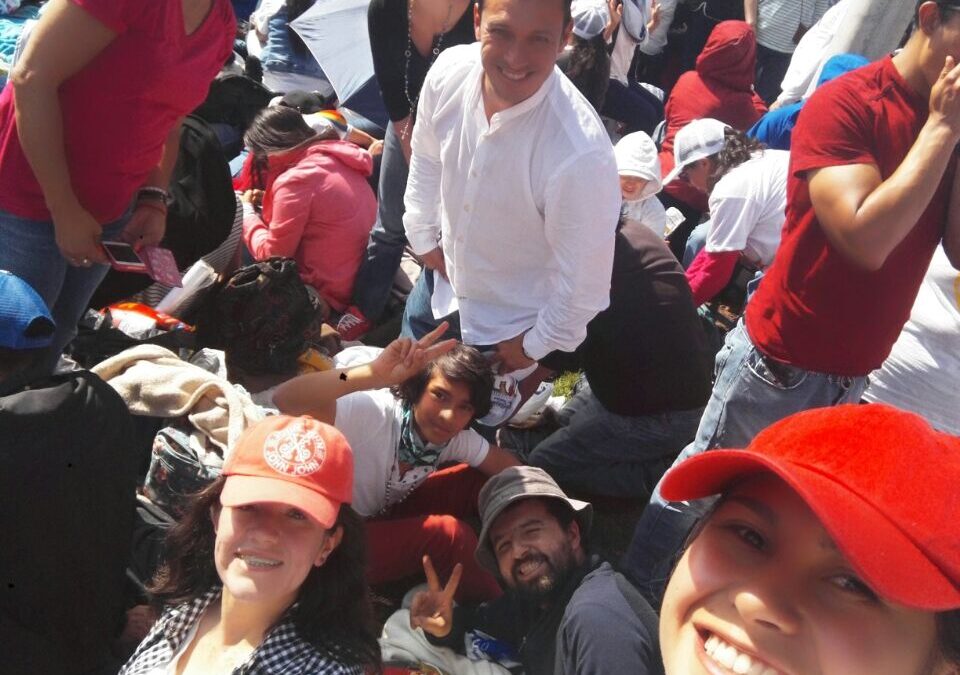
13 Sep 2017 | Focolare Worldwide
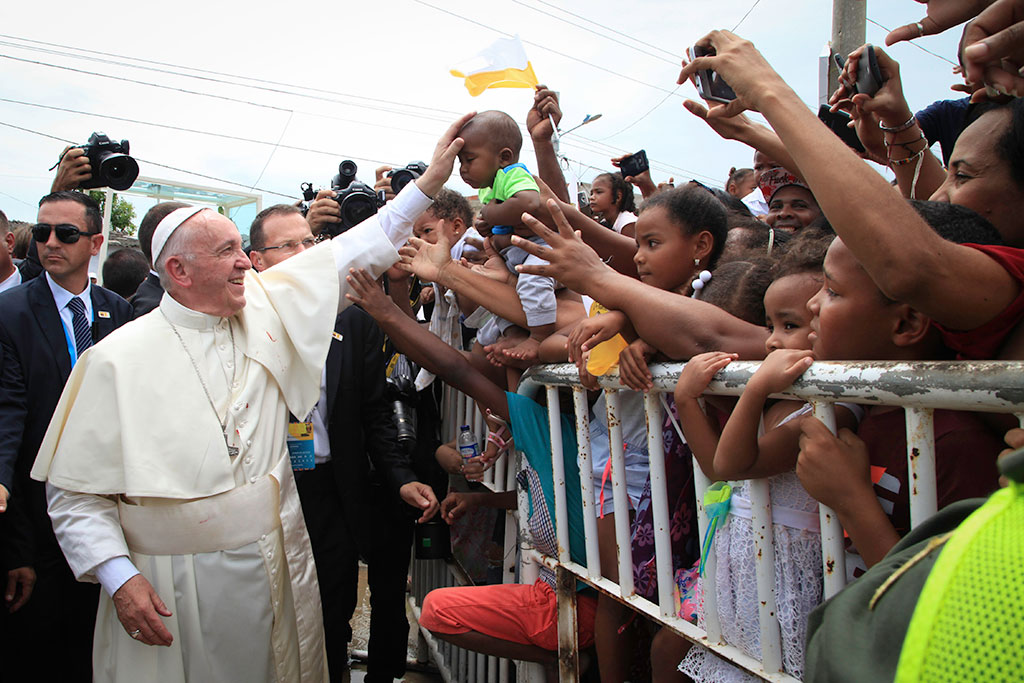
Foto: Jose-MIguel-Gomez – Conferenza Episcopale Colombiana
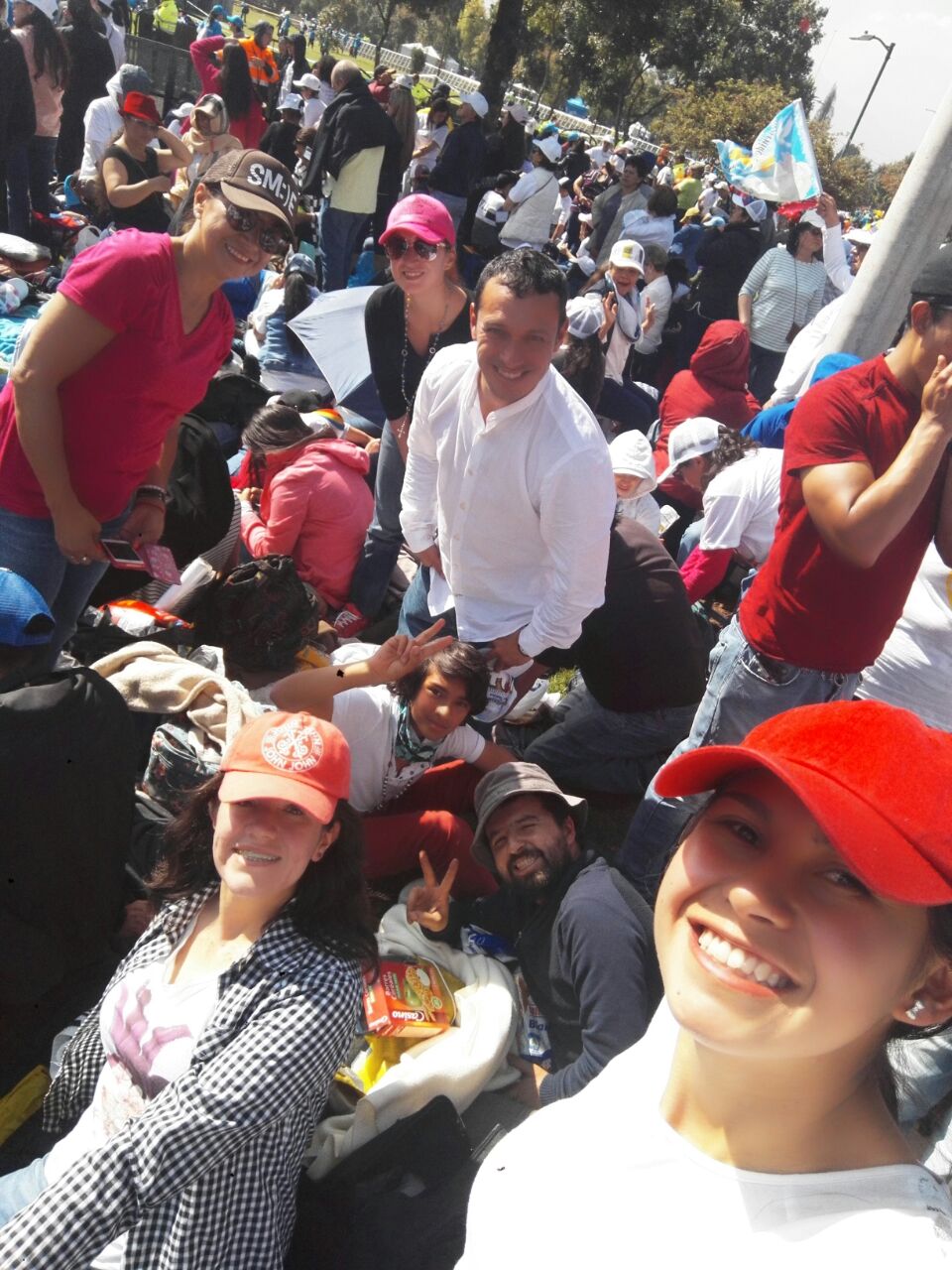 Cartagena de Indias, north of Colombia, is the home of the Shrine of St Peter Claver (1581-1654). He was declared a saint in 1888 and had been a Spanish Jesuit who dedicated himself to the tragic victims of slavery. At the suggestion of the Jesuits, after the peace accord between the government and the Farc which had put an end to the 50 years of conflict with 200 thousand dead and tens of thousands missing, it became the capital of human rights. The Pope visited the poorest neighbourhoods, stopping in at the house of 77 year old Lorenza Perez, who cooks and distributes meals to anyone in need. “I’m the poorest of the poor,” she says. “But the Pope chose my house to tell the world to have more love for those that are discarded. Susanna Nuin explains: “The Pope’s speeches had two dimensions: on conceptual, with strong and precise clarifications; and the other gestural, to express his closeness to a people that has suffered much. His departure left us with a sense of loss, but also a sense of fulfilment. His visit has instilled a new way of living in the hearts of the Colombian people, no longer from a passive stance, waiting for a peace that never comes, succumbing to a polarization that makes peaceful coexistence impossible. The young people played a fundamental role, who felt like they had been invested with a task. Yolima Martínez recalls the Pope’s appeal: “You young people have a special gift for recognizing the suffering of others.” Laura Isaza: “Peace is a process that engages all generations, but ours especially.” Manuel echoes her words: “The Pope’s visit has clarified to the Colombians that peace isn’t a political matter, but culture that needs to be built. As Focolare members we feel even more committed to listen to Pope Francis when he talks about a culture of encounter that we have to continue to build.”
Cartagena de Indias, north of Colombia, is the home of the Shrine of St Peter Claver (1581-1654). He was declared a saint in 1888 and had been a Spanish Jesuit who dedicated himself to the tragic victims of slavery. At the suggestion of the Jesuits, after the peace accord between the government and the Farc which had put an end to the 50 years of conflict with 200 thousand dead and tens of thousands missing, it became the capital of human rights. The Pope visited the poorest neighbourhoods, stopping in at the house of 77 year old Lorenza Perez, who cooks and distributes meals to anyone in need. “I’m the poorest of the poor,” she says. “But the Pope chose my house to tell the world to have more love for those that are discarded. Susanna Nuin explains: “The Pope’s speeches had two dimensions: on conceptual, with strong and precise clarifications; and the other gestural, to express his closeness to a people that has suffered much. His departure left us with a sense of loss, but also a sense of fulfilment. His visit has instilled a new way of living in the hearts of the Colombian people, no longer from a passive stance, waiting for a peace that never comes, succumbing to a polarization that makes peaceful coexistence impossible. The young people played a fundamental role, who felt like they had been invested with a task. Yolima Martínez recalls the Pope’s appeal: “You young people have a special gift for recognizing the suffering of others.” Laura Isaza: “Peace is a process that engages all generations, but ours especially.” Manuel echoes her words: “The Pope’s visit has clarified to the Colombians that peace isn’t a political matter, but culture that needs to be built. As Focolare members we feel even more committed to listen to Pope Francis when he talks about a culture of encounter that we have to continue to build.”
11 Sep 2017 | Focolare Worldwide
After Hurricane Irma’s passage over the Caribbean where it caused death and destruction, the violent storm hit Florida, which has been declared in a state of emergency. More than 5.8 million people have been left without electricity, running water or internet. Five deaths have been confirmed. It has now weakened to a category 1 hurricane, with 136 kilometer winds, and is now heading towards Atlanta, Georgia. The local Focolare community writes: “We’re in constant contact with our community in Florida. Many have had to leave their homes and find safe places to stay. They tell us that they are trying to help people who are all alone, neighbors and parents and relatives living outside the country, and the same goes for the communities on the islands. The weakening hurricane is expected to arrive in Atlanta on Monday or Tuesday with a lot of rain and strong wind. We are seeing God’s love in all of this and experiencing how much we’re all brothers and sisters, thanks to this crisis. We’re finding that we can help each other, beyond the social divisions that are quite secondary now.”
8 Sep 2017 | Focolare Worldwide
Mexico has often been struck by seismic movements because it lies in a region where 5 tectonic plaques meet. But the earthquake which hit the nation on September 8 has been so far the most violent earthquake ever recorded (8.2 on the Richter scale). With the epicenter off the west coast, on the border with Guatemala, the earthquake was felt even as far as Mexico City. Much of the capital has remained without electricity and many people abandoned their houses going out into the dark streets. At least 15 have been found dead, although “the toll estimate is set to rise,” said President Enrique Peña Nieto. Oaxaca is the State which has been most hit. The Mexican bishops write: “God strengthens us as brothers and sisters in the faith, mobilising us towards those who have suffered because of this earthquake.” In Guatemala, one victim has been recorded.
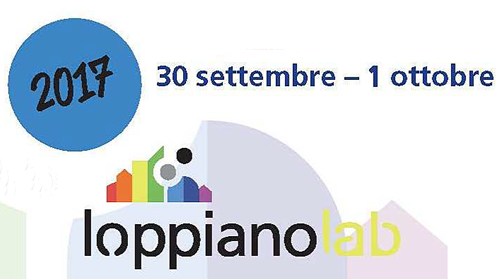
8 Sep 2017 | Focolare Worldwide, Senza categoria
 The national workshop on economy, culture, communication, education and innovation is annually promoted by New City, Polo Lionello Bonfanti, Sophia University Institute, and the town of Loppiano which is hosting the event. In response to Pope Francis’s invitation, the aim of the convention is to offer the occasion for dialogue and proposals on the foremost issues in our country: from immigration to work, poverty to social inclusion, and battles against corruption to commitment for the common good, family, youth, education and many more. The convention will expound receptiveness to counter exclusion and the quest for private interest, promote new civic virtues to find solutions to the contradictions of our time, and act on the unjust structures that produce – precisely – “victims and bandits.” LoppianoLab is thus a cultural laboratory where the seeds of a new mentality will subsequently be sown, in the conviction that the pursuit of profit cannot be the compass for every human activity. The event is open to all those who question themselves on these themes and wish to become “artisans of change.” For information write to: loppianolab.accoglienza@loppiano.it
The national workshop on economy, culture, communication, education and innovation is annually promoted by New City, Polo Lionello Bonfanti, Sophia University Institute, and the town of Loppiano which is hosting the event. In response to Pope Francis’s invitation, the aim of the convention is to offer the occasion for dialogue and proposals on the foremost issues in our country: from immigration to work, poverty to social inclusion, and battles against corruption to commitment for the common good, family, youth, education and many more. The convention will expound receptiveness to counter exclusion and the quest for private interest, promote new civic virtues to find solutions to the contradictions of our time, and act on the unjust structures that produce – precisely – “victims and bandits.” LoppianoLab is thus a cultural laboratory where the seeds of a new mentality will subsequently be sown, in the conviction that the pursuit of profit cannot be the compass for every human activity. The event is open to all those who question themselves on these themes and wish to become “artisans of change.” For information write to: loppianolab.accoglienza@loppiano.it

 The words Pope Francis pronounced at the World Youth Day in Rio de Janeiro in 2013, “Go out and serve without fear,” triggered in the youths of the Focolare, the desire to take up the challenge. And so, those of the city of Juiz de Fora (500,000 inhabitants), in the Brazilian state of Minas Gerais, launched a project that gathers the youths of different charisms. “The aim is to testify to unity in the diversities of the Church,” they said, “and be disciples of Christ and missionaries, in line with the invitation of the Latin American bishops to all Christians. Of course, there are difficulties, but this does not discourage us.” It was Archbishop Gil Antonio Moreira who gave the group – of 60 – the name of “Young Continental Missionaries”. “We come from different spiritual experiences – they explained – Renewal in the Spirit, new Communities, parish groups and the Focolare Movement. The start of the mission consists in the personal consecration to God for a year, renewable for another year. And then there are three points that help set the compass: prayer, training and mission, and putting ourselves at the service of others.” F
The words Pope Francis pronounced at the World Youth Day in Rio de Janeiro in 2013, “Go out and serve without fear,” triggered in the youths of the Focolare, the desire to take up the challenge. And so, those of the city of Juiz de Fora (500,000 inhabitants), in the Brazilian state of Minas Gerais, launched a project that gathers the youths of different charisms. “The aim is to testify to unity in the diversities of the Church,” they said, “and be disciples of Christ and missionaries, in line with the invitation of the Latin American bishops to all Christians. Of course, there are difficulties, but this does not discourage us.” It was Archbishop Gil Antonio Moreira who gave the group – of 60 – the name of “Young Continental Missionaries”. “We come from different spiritual experiences – they explained – Renewal in the Spirit, new Communities, parish groups and the Focolare Movement. The start of the mission consists in the personal consecration to God for a year, renewable for another year. And then there are three points that help set the compass: prayer, training and mission, and putting ourselves at the service of others.” F our years after the launch of the project, numerous missions have been undertaken in the parishes of the Juiz di Fora archdiocese, with a hundred visits to the families of the rural communities at the outskirts and violent districts of the city, the asylums and orphanages, and the rehabilitation centre for minors with criminal records. “We created socio-health programmes, as in the case of the battle against dengue (tropical disease), operating wherever there were the highest death rates. In particular, we worked to ensure hygiene in the environment, eliminating rubbish and dump sites that enhance the proliferation of mosquitoes that transmit the disease, but also informing the population through brochures and posters. At the moment we are carrying out special missions in Haiti and in the city of Obidos (State of Pará), in the Educational Centre for juvenile offenders and with the “cartoneros” (rubbish bin collectors of cardboard which is then recycled). We highlighted the importance of their work for the benefit of our great home: the planet Earth. We did not miss out in supporting the youth economically and psychologically, in particularly difficult situations. Furthermore, the “supportive Christmas” project enabled us to gather nonperishable food and other essential goods, that were then donated to a charitable institution.”
our years after the launch of the project, numerous missions have been undertaken in the parishes of the Juiz di Fora archdiocese, with a hundred visits to the families of the rural communities at the outskirts and violent districts of the city, the asylums and orphanages, and the rehabilitation centre for minors with criminal records. “We created socio-health programmes, as in the case of the battle against dengue (tropical disease), operating wherever there were the highest death rates. In particular, we worked to ensure hygiene in the environment, eliminating rubbish and dump sites that enhance the proliferation of mosquitoes that transmit the disease, but also informing the population through brochures and posters. At the moment we are carrying out special missions in Haiti and in the city of Obidos (State of Pará), in the Educational Centre for juvenile offenders and with the “cartoneros” (rubbish bin collectors of cardboard which is then recycled). We highlighted the importance of their work for the benefit of our great home: the planet Earth. We did not miss out in supporting the youth economically and psychologically, in particularly difficult situations. Furthermore, the “supportive Christmas” project enabled us to gather nonperishable food and other essential goods, that were then donated to a charitable institution.”  The Young Continental Missionaries began to settle in other places over time, and reached Obidos (State of Pará), the heart of the Amazons. “Coming in contact with the people, we saw that the call to missionary life echoed in them, and a variety of vocations came to the fore.” Surpassing the confines of Brazil, they even reached Haiti. Last 17 July, a group of six people of the archdiocese of Juiz de Fora and their archbishop set out for Haiti. The situation of that country is really challenging, 7 years after the earthquake that had devastated it: in just 24 seconds more than 300,000 buildings had collapsed among civil and institutional structures, causing the death of 200,000 people. With its magnitude of 7.2 on the Richter scale, it was the worst earthquake registered in the Americas. “Haiti is the poorest periphery of Latin America. And that is where, “Bishop Gil Antonio Moreira wrote, “my eyes and those of the Continental Missionary Youth are focusing on. With great joy we shall go to serve without fear, because the reason, and our goal, is Jesus Christ.” The youth of the Focolare concluded by saying: “Paradoxically, what assures us that we are on the right path are the difficulties we encounter, and in which we try to love a countenance of Jesus Forsaken, He is the secret of our joy and the fruits we have seen.”
The Young Continental Missionaries began to settle in other places over time, and reached Obidos (State of Pará), the heart of the Amazons. “Coming in contact with the people, we saw that the call to missionary life echoed in them, and a variety of vocations came to the fore.” Surpassing the confines of Brazil, they even reached Haiti. Last 17 July, a group of six people of the archdiocese of Juiz de Fora and their archbishop set out for Haiti. The situation of that country is really challenging, 7 years after the earthquake that had devastated it: in just 24 seconds more than 300,000 buildings had collapsed among civil and institutional structures, causing the death of 200,000 people. With its magnitude of 7.2 on the Richter scale, it was the worst earthquake registered in the Americas. “Haiti is the poorest periphery of Latin America. And that is where, “Bishop Gil Antonio Moreira wrote, “my eyes and those of the Continental Missionary Youth are focusing on. With great joy we shall go to serve without fear, because the reason, and our goal, is Jesus Christ.” The youth of the Focolare concluded by saying: “Paradoxically, what assures us that we are on the right path are the difficulties we encounter, and in which we try to love a countenance of Jesus Forsaken, He is the secret of our joy and the fruits we have seen.”




